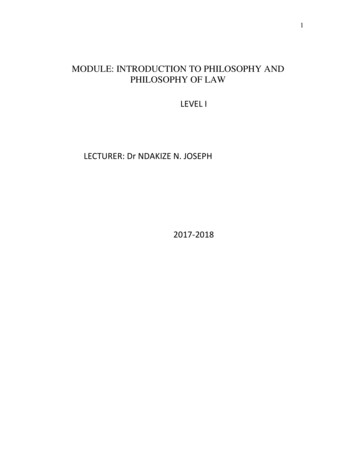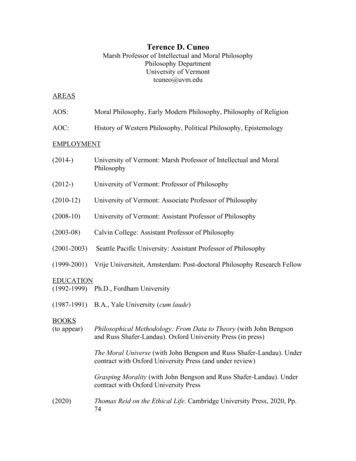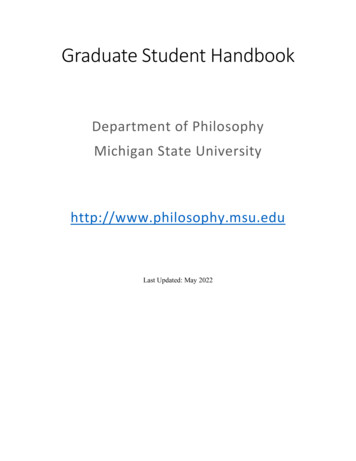
Transcription
Journal of Philosophy, Inc.Killing, Abortion, and Contraception: A Reply to MarquisAuthor(s): Alastair NorcrossSource: The Journal of Philosophy, Vol. 87, No. 5 (May, 1990), pp. 268-277Published by: Journal of Philosophy, Inc.Stable URL: http://www.jstor.org/stable/2026835Accessed: 04/03/2009 18:45Your use of the JSTOR archive indicates your acceptance of JSTOR's Terms and Conditions of Use, available rms.jsp. JSTOR's Terms and Conditions of Use provides, in part, that unlessyou have obtained prior permission, you may not download an entire issue of a journal or multiple copies of articles, and youmay use content in the JSTOR archive only for your personal, non-commercial use.Please contact the publisher regarding any further use of this work. Publisher contact information may be obtained herCode jphil.Each copy of any part of a JSTOR transmission must contain the same copyright notice that appears on the screen or printedpage of such transmission.JSTOR is a not-for-profit organization founded in 1995 to build trusted digital archives for scholarship. We work with thescholarly community to preserve their work and the materials they rely upon, and to build a common research platform thatpromotes the discovery and use of these resources. For more information about JSTOR, please contact support@jstor.org.Journal of Philosophy, Inc. is collaborating with JSTOR to digitize, preserve and extend access to The Journalof Philosophy.http://www.jstor.org
268THE JOURNALOF PHILOSOPHYof which it can be deprived. A living human cell that might be stimulated to develop into a clone of a person does not now have a personal future. A fetus similarly has only the potentiality to develop apersonal future. For this reason, killing a fetus is morally very different from killing a normal adult human.PETER K. MCINERNEYOberlin CollegeKILLING, ABORTION, AND CONTRACEPTION:A REPLY TO MARQUIS*Don Marquis, in "Why Abortion is Immoral,"' argues that "abortionis, except possibly in rare cases, seriously immoral, that it is in thesame moral category as killing an innocent human being" (183). Hisargument for this is that abortions share with killings the centralfeature that makes them wrong. "Killing someone is wrong, primarily because the killing inflicts (one of) the greatest possible losses onthe victim . . . the loss . . . of all those activities, projects, experi-ences, and enjoyment which would otherwise have constituted [thevictim's] future personal life" (189). Marquis argues that, since fetuses have futures that include a set of "experiences, projects, activities and such which are identical with the futures of adult humanbeings," it follows that abortion is "prima facie seriously morallywrong" (192). Marquis answers several possible objections to hisaccount. In this paper, I shall discuss the one objection to which hisanswer is clearly inadequate. I shall claim not only that his answer isinadequate, but that an adequate answer is not available to him, andthus that his account fails to support the claim that the overwhelmingmajority of abortions are seriously immoral.IMarquis admits that, if his account of the wrongness of killing and ofabortion entails that contraception is also seriously immoral, "thenthere would appear to be a difficulty with the analysis of [the] essay"(201). He claims that his analysis would entail that contraception iswrong "only if something were denied a human future of value bycontraception. Nothing at all is denied such a future by contraception, however" (201). Marquis considers and rejects four candidates* Thanks are due to Jonathan Bennett, Frances Howard, Joel Kidder, and StevenLee for helpful comments on an earlier draft of this paper.'Don Marquis, "Why Abortion is Immoral," this JOURNAL, LXXXVI, 4 (April1989): 183-202.0022-362X/90/8705/268-277?) 1990 The Journal of Philosophy, Inc.
KILLING,ABORTION,ANDCONTRACEPTION269for the role of subject of harm by contraception: (1) some sperm orother, (2) some ovum or other, (3) a sperm and an ovum separately,(4) a sperm and an ovum together. I shall concentrate on his treatment of (4), since I think it is clearly the most promising candidate.Marquis offers the following argument in response to the suggestion that contraception deprives the combination of sperm and ovumof a valuable future-like-ours:At the time of contraception,there are hundredsof millionsof sperm,one (released)ovumand millionsof possiblecombinationsof all of these.There is no actualcombinationat all. Is the subjectof the loss to be edoes not yieldan actualsubjectof harmeither. Accordingly,the immoralityof contraception is not entailedby the loss of a future-like-oursargumentsimplybecause there is no nonarbitrarilyidentifiablesubjectof the loss in thecase of contraception(202).I do not think it is clear from this passage what Marquis is claiming.It is all we get by way of argument against candidate (4), however, sowe will have to work with it. I take it that Marquis does not mean thatwe could never tell which combination of sperm and ovum is thesubject of loss in the case of successful contraception. I do not seehow such an epistemic difficulty could rescue contraception fromthe charge of wrongdoing that Marquis's account levels againstabortion. Consider the following two scenarios: (i) London is struckby a series of freak accidents involving power plants, which result inthe deaths of almost everyone within a twenty-mile radius of Whitehall. The Prime Minister, Mrs. Butcher, is informed that there are ahandful of survivors. She orders the army to round up the survivors,make a record of their names, and kill them. (ii) In response to thesame information as in the previous example, Mrs. Butcher orders ahydrogen bomb to be detonated in London, thereby eliminating thepossibility of discovering who survived the initial accidents. I hope itis clear that at least part of what is morally wrong with Mrs. Butcher'sactions in each case is that some people are killed who would otherwise have lived. It makes no difference that in case (ii) it is impossibleto tell which people were killed by the nuclear explosion.It might be objected that contraception differs crucially from myexample (ii) in that one cannot say of every use of contraception thatit prevents conception. In most cases pregnancy would not haveresulted anyway. One response to this would be to modify (ii) so thatMrs. Butcher is only told that there is a small but significant possibility that there are survivors. More importantly, though, I think itwould be small comfort to the proponent of the moral acceptabilityof contraception to be told that contraception is morally permissiblein all those cases in which it does not actually prevent conception.
270THE JOURNALOF PHILOSOPHYThe intuition that contraception is morally permissible is the intuition that it is permissible even, or perhaps especially, in those casesin which it fulfills its purpose.Perhaps Marquis is not simply making an epistemic claim when hesays that there is no nonarbitrarily identifiable subject of loss in thecase of contraception. When he says that there are millions of possible combinations of sperm and ovum, but no actual combination,perhaps he means that there is no fact of the matter as to whichsperm, if any, would have fertilized the ovum. It may be that thebehavior of sperm is not strictly deterministic. Does this distinguishcontraception from abortion and killing?Consider the following scenario: two prisoners of conscience,Smith and Jones, are slated for execution in a small totalitarianrepublic. The president, Shrub, troubled by the effect of an AmnestyInternational campaign on his public image, decides to spare one ofthe prisoners. He cannot make up his mind whose life to spare, so hedevises the following apparatus: Smith and Jones are placed in separate cells, each with air vents leading to a cannister of poison gas,which is set to release its contents at noon. A computer is programmed to select a three-digit number at random at one secondbefore noon. If the number is even or zero, the computer will closethe air vent in Smith's cell; if the number is odd, the computer willclose the air vent in Jones's cell. The random-number selection process is truly indeterministic. The vice-president of the republic, Fowl,does not approve of Shrub bowing to liberal pressure. Fowl unplugsthe computer at one minute before noon. The gas is released atnoon, and both Smith and Jones die. I hope it is clear that Fowl hasdone something bad in this example. Two people have died insteadof one. It is also clear that there is no fact of the matter as to whichprisoner has been deprived of a valuable future by Fowl's actions. Ido not think that the moral status of Fowl's action would change ifthe number of condemned prisoners was increased, but the numberto be saved was kept at one. Even if Fowl's action makes it the casethat a million and one die, instead of a million, he would have beenresponsible for the occurrence of one more death than would otherwise have occurred. In both of these cases, it seems that there is nononarbitrarily identifiable subject of the loss of a valuable future. Inboth of these cases, Fowl's action is morally on a par with killing oneperson.Let us return to the two-person case. We might still want to saythat Fowl has harmed both Smith and Jones. We might say that theharm consists in lowering, from fifty percent to zero, their chances ofsurviving. (Indeed, given uncertainty about the length and quality ofanyone's life, we should probably give a similar account of the harminvolved in killing anyone.) If we increase the numbers, we can still
KILLING,ABORTION,ANDCONTRACEPTION271say that Fowl has harmed all the prisoners. In the case of a millionand one prisoners, Fowl has reduced each of their chances of survivalfrom just under one ten thousandth of one percent to zero. Howeverwe describe the immorality of Fowl's action, it is clear that what hedoes is wrong for precisely the same reason as a standard killing iswrong. Either Fowl harms all the prisoners, or the lack of a nonarbitrarily identifiable subject of loss does not provide a morally relevantdistinction between this case and a standard case of killing.The similarities between contraception and the example discussedabove are clear in terms of the loss of a valuable future. Eithercontraception harms all the combinations of sperm and ovum, or thelack of a nonarbitrarily identifiable subject of loss does not provide amorally relevant distinction between contraception and abortion.IIIt might be claimed that there is a significant difference between thecase of contraception and my poison-gas examples. In the poison-gasexample, all the candidates for subject of the loss of a valuable futurewere things, people, in fact. In the case of contraception, the candidates I have been considering-combinations of sperm and ovumare nonstarters, not because there is no nonarbitrarily identifiablesubject of loss, but because a combination of sperm and ovum cannot be a subject of anything, because "it" is not a thing.2 I do notknow whether Marquis would be prepared to make this claim, but itis worth considering on its own merits.It might be instructive at this point to consider what could bemeant by 'a combination of sperm and ovum'. What has to be thecase for such a thing to exist? It might be natural to assume that, forsuch a thing to exist, a sperm and an ovum would have to be combined. What would have to be the case for a sperm and ovum to becombined? Perhaps a sperm and an ovum would have had to havejoined to form a zygote. Marquis might be taken to be espousing thisreading of 'a combination of sperm and ovum' when he claims thatthere is no actual combination at the time of contraception. If this ishis position, then he is, of course, right to say that there is no actualcombination at the time of contraception (in the case of those formsof contraception which prevent a zygote from being formed, that is;it is an interesting question what Marquis would say about thoseforms of contraception which prevent the zygote from developing).If this is his position, though, why should we agree that his fourcategories of candidates for subject of harm are exhaustive? Why canwe not say that the subject of harm is the mereological sum of asperm and an ovum? Indeed, this is what I understand 'a combination of sperm and ovum' to mean. So what is the response to the2This argument was suggested to me by Frances Howard.
272THE JOURNAL OF PHILOSOPHYclaim that a combination of sperm and ovum, understood as a mereological sum, is not a thing?Perhaps the most obvious answer to the charge that a combinationof sperm and ovum is not a thing is simply to deny it. I am inclined topursue this option. To the extent that I am prepared to admit that azygote or a fetus is a thing, I would claim that a combination ofsperm and ovum is also a thing.Let us assume, for the sake of argument, that a combination of asperm and an ovum is not a thing. In that case, either the sperm andovum, taken separately, are things, or neither is (I cannot imagine aplausible metaphysic that would classify one as a thing, but not theother). Consider the former alternative first. If both the sperm andthe ovum are things, but the combination of the two is not, why canwe not say that contraception harms both, because it deprives eachone of the valuable future it would have had as a result of causalinteraction with the other? This would appear to be Marquis's candidate (3), "a sperm and an ovum separately." Marquis rejects (3),because, "on this alternative, too many futures are lost. Contraception was supposed to be wrong, because it deprived us of one futureof value, not two" (201). The obvious reply to this is that, on theassumption that a sperm and an ovum are both things, there is onlyone future lost as a result of contraception. It is the same future forboth the sperm and the ovum. It is a shared future. Consider thepossibility of human fusion. Imagine that it is possible for twvopeopleto fuse physically, so that a single person results, who has, amongother things, some of the memories of both of the original people.3Imagine further that two people, Smith and Jones, will die, if they donot fuse with each other. Hector, an enemy of both Smith and Jones,knows of their predicament and of their plan to fuse. He locks themin adjoining rooms and waits until their anguished cries die outbefore gloating over their dead bodies. Given that Smith and Joneswould have fused, if Hector had not locked the connecting door, itseems that Hector has deprived both Smith and Jones of a valuablefuture-the same valuable future. It might be objected that Hectorhas not deprived Smith and Jones of a valuable future, because theywould have ceased to exist after they had fused, and a third personwould have come into existence.4 In this case, Hector has simply3It might be objected that one cannot have a memory of, say, doing x, if one didnot, oneself, do x. So, to say that the resulting person has some of the memories ofboth original persons might entail that the resulting person is both original persons.My argument does not require any such claim, so it is acceptable to modify the storyso that it is merely claimed that the resulting person seems to have some of thememories of both original persons.4 It is important to note that, for Marquis, the central wrong-making feature ofkilling is that it deprives the victim of those valuable experiences which she wouldotherwise have had. A killing of someone who was about to die is not, therefore,
KILLING,ABORTION,AND CONTRACEPTION273prevented the existence of something with a valuable future. I do notthink that such a distinction could possibly ground a judgment thatHector has not behaved at least as badly as if he had killed oneperson, who would otherwise have lived. However we describe Hector's action, it is clear that what he has done is morally on a par withkilling. Could anyone honestly insist that it would be permissible forHector to shoot Smith and Jones as they are running toward eachother, about to fuse, but impermissible for him to shoot the personwho results from the fusion a few seconds later?IIIThe case of contraception, it might be argued, differs from my fusionexample, because the sperm and the ovum are not things themselves.Before conception, goes the claim, there is just some stuff-fundamental particles or metaphysical simples or whatever-arranged insuch a way that we are inclined to say that there is a sperm and anovum. At conception, or thereabouts, all this stuff interacts in such away that a thing comes into existence. This may seem like a drowningmetaphysician clutching at straws, but I do not think that this, even ifit is a good account of what there is, will ground a moral distinctionbetween contraception and abortion.Let us say, what is perhaps natural, that, in order to deprive something of a valuable future, that thing must at some time exist. So letus define an intransitive verb, 'to deprave' (not to be confused withthe transitive verb 'to deprave'): to deprave is to act in such a way thatsome stuff, which would otherwise have interacted in such a way thata thing with a valuable future would have resulted, does not sointeract. There would seem to be pairs of cases of contraception andabortion such that the contraception is a case of depraving, and theabortion is a case of depriving something of a valuable future. Somepairs of a depraving and a depriving differ only in that the hostileenvironment created by the contraceptive/abortifacient has the desired effect on the stuff before a thing comes into existence, in thecase of the depraving, but on the thing after it has come into existence, in the case of the depriving. If there is a moral differencebetween a depraving and a depriving, it must be grounded in the factthat there is just some stuff that would otherwise have resulted in theexistence of a thing, in the case of a depraving, but there actually is athing, in the case of a depriving.If we are to defend Marquis's position on the morality of abortionand contraception by appealing to the distinction between deprivingand depraving, we must investigate further the category of "thing,"morally bad, or at least does not share the central wrong-making feature of killingsof people who would otherwise have lived long happy lives.
274THE JOURNAL OF PHILOSOPHYwhich is at the heart of the distinction. It might be instructive toremind ourselves of Marquis's treatment of the anti-abortionist'sattempt to base an argument on the category "human being":If 'humanbeing' is takento be a biologicalcategory,then the anti-abortionist is left with the problem of explainingwhy a merely biologicalcategoryshould makea moraldifference.Why,it is asked,is it anymorereasonableto base a moralconclusionon the numberof chromosomesin one's cells than on the color of one's skin?If 'humanbeing', on theother hand, is takento be a moralcategory,then the claimthat the fetusis a human being cannot be taken to be a premisein the anti-abortionargument,for it is preciselywhat needs to be established(186).A similar argument can be used against an attempt to distinguishmorally between contraception and abortion by appealing to thecategory "thing." Consider a case of depraving and a case of depriving something of a valuable future, which differ as little as is consistent with the former being definitely a case of depraving and thelatter being definitely a case of depriving (the category of "thing"might have vague boundaries). In each case, there is some stuff thatis affected by the contraceptive/abortifacient. In the latter case, butnot in the former, there is also a thing that is the result of theinteraction of the stuff. How might we establish that there is a thingin the latter case, but not in the former? If Marquis's position is to bedefended, whatever makes the difference between thing and nothingmust be definable without help from moral judgments on abortionand contraception, because those judgments are supposed to ariseout of the difference between thing and no-thing. The most likelyoption would be to appeal to biological facts about the arrangementand interaction of the stuff in each case. But if our explanation of thedifference between thing and no-thing depends simply on biologicalfacts, it seems that we will still have to argue that the differencebetween a depraving and a depriving is morally significant.IVMarquis might object at this point that he does not have to argue thatthe difference between a depriving and a depraving is morally significant, because it is just obvious that there is a morally importantdifference between depriving a thing of its potentialities and preventing it from coming about that there is a thing with potentialities.It is difficult to know what to say to this, except to point out that it isfar from obvious to me. Perhaps we could point out that a similar lineof defense could be used by the pro-abortionists who argue thatfetuses (at least in the early stages) cannot be victims. It is just obvious, we might claim, that an early fetus cannot be a victim, because itlacks sentience. Alternatively, we might claim that it is just obviousthat there is a morally significant difference between depriving asentient victim of a valuable future, on the one hand, and depriving a
KILLING,ABORTION,ANDCONTRACEPTION275presentient victim of a valuable future, on the other. Of course, wemight also claim that it is obvious that there is a morally significantdifference between depriving something that has not been born yetof a valuable future and depriving something that has been born of asimilar future. We might disagree with Marquis's claim that the central wrong-making feature of a killing is that it deprives something ofa valuable future. On the one hand, we might claim instead that thecentral wrong-making feature of a killing is that it deprives a certainspecified sort of something of a valuable future. On the other hand,we might claim that the central wrong-making feature of a killing iswhat a depriving and a depraving have in common. I have tried toshow that the distinction between thing and no-thing is no moremorally significant than the distinction between sentient thing andpresentient thing. Of course, one can always claim that a particularintuition is just rock-bottom. But if that is Marquis's claim about thedistinction between thing and no-thing, then I would claim that hehas given no arguments against abortion that would appeal to any ofthose who do not share his intuitions. My argument is not, however,that we should simply pick whichever distinction we feel moststrongly about, and then base our position around that; at least notwith respect to the question of what is bad about depriving something of a valuable future. I would claim that a consideration of thevarious distinctions-between postnatal and prenatal thing, betweensentient and presentient thing, between thing and no-thing-shouldlead us to reject the claim that any of them makes a moral differencewith respect to what is bad about depriving something of a valuablefuture (and, of course, what is bad about preventing it from comingabout that there is a thing with a valuable future).vAnother approach to the question of whether we should imbue thedistinction between thing and no-thing with moral significancewould be to ask why it is bad to deprive something of a valuablefuture. As far as I can see, there are two broad approaches that canbe taken to answer this question (other than simply insisting that it isbad). On the one hand, we could claim that it is bad to deprivesomething of a valuable future, because it is bad, other things beingequal, to prevent the occurrence of the valuable experiences and thelike that constitute a valuable future. I hope it is clear why thisapproach will militate against drawing a morally significant line between depraving and depriving. On the other hand, we could claimthat it is bad to deprive something of a valuable future, because thevictim is, in some sense, entitled to her valuable future. We might saythat she has a right to her valuable future. This would seem to allowus to draw a line between depraving and depriving. Depriving something of a valuable future violates certain rights of that thing. A
276THE JOURNAL OF PHILOSOPHYdepraving, on the other hand, involves no violations of rights, because there is no victim. The right to life, though, is far from unproblematic. Why does anything have a right to a valuable future, asopposed to, say, a very bad future, or no future at all? Why does thisfetus have a right to the future that would ensue if I do not performthe abortion, rather than the future that would ensue if I do?5 Wecannot answer that question with an appeal to the supposed immorality of performing an abortion, since it is that very immorality thatwe are seeking to establish by appeal to the right to a valuable future.How, in general, can we explain why something has a right to thegood aspects of its future, but not to the bad ones? Perhaps we couldappeal to the goodness of such good aspects obtaining (goodness,that is, that is not dependent on the claim that the possessor of such afuture has a right to those good aspects). If my right to a valuablefuture is grounded in the value of the occurrence of those experiences and the like that constitute such a future, however, the verysame grounding will apply to the immorality of a depraving.Perhaps it could be argued that my right to a certain sort of futureis not restricted to a valuable future. In fact, I have a right to all theunpleasantness that might be in my future, too. It is a commonfeature of rights that they can be waived, and so I am taken to havewaived my rights to the unpleasant aspects of my future. Thus, it isnot true to say of a doctor, who has deprived me of much pain aildsuffering, that she has violated my rights. If we take this line, it is veryhard to see what is being claimed as the content of something's rightto a future. If my right is not restricted to valuable aspects of myfuture, just what do I have a right to? I presume the claim is not that Ihave a right to my actual future, because, if that were the case, noactual behavior that affected me could violate such a right. Perhapsthe content of my right varies, according to the situation I am in.Perhaps, in general, I have a right to whatever future would ensue, ifthe agent who might act so as to affect me does not so act. But thisclearly will not do. If an agent's action will affect me, then his notperforming the action will also affect me, since my future will bedifferent from how it would otherwise have been.Perhaps we will have to postulate a distinction between doing andallowing, and claim that I have a right to the future that would haveensued, if the agent had not done the thing in question. Quite apart5 It might sound strange to talk of the future that would ensue for the fetus if Iperform an abortion. The fetus, it would seem, will have no future if I perform anabortion. I think it is clear, however, that the option of nonexistence for a fetus, oran adult human being, can be compared with other possible futures. It is also clearthat nonexistence is preferable to some futures, futures filled with unmitigated painand misery, for example. If we ask what sort of a future a fetus (or any other being)has a right to, it would be strange to exclude nonexistence from the options beingconsidered.
KILLING,ABORTION,ANDCONTRACEPTION277from the difficulty of drawing a distinction between doing and allowing (or anything remotely resembling such a distinction), and themuch greater difficulty, if not impossibility, of establishing that sucha distinction can bear any moral weight, this distinction does notaccord with our normal intuitions about rights. Any version of thedoing/allowing distinction will have to place the neglect of a newborn baby, so that it starves to death, on the side of allowing. But itwould be a strange position indeed that condemned abortion as theviolation of the fetus's right to a valuable future, but did not renderthe same judgment about allowing a new-born to starve to death.Perhaps Marquis could claim that a thing that might have a valuablefuture just does have a right to a valuable future, and that is all thereis to it. I would claim that, if we are disinclined to accept such a rightas a basic intuition and seek some grounding for the right, we willhave a hard time finding grounding for such a right which will notalso ground the immorality of contraception.VII have attempted to give reasons why we should be, at the very least,uncomfortable with allowing moral weight to the distinction betweenthing and no-thing, and thus the distinction between abortion andcontraception. Lest I be taken to be arguing against contraception(and, indeed, sexual abstinence), I should add that I do not considerthe deprivation of a valuable future to be the only, or even thecentral, wrong-making feature of a standard killing. Thus, althoughwhat is bad about depriving someone of a valuable future is sharedby abortion, regular use of contraception, and sexual abstinence,there are many morally significant factors that distinguish standardkillings from abortions, and abortions from contraception. But theyare the subject of another paper.6I have argued in this paper that Marquis fails to distinguish morally between contraception and abortion. I have also argued that anattempt to distinguish between contraception and abortion by appeal to a parsimonious ontology does not provide a morally relevantdistinction. I conclude that Marquis is unable to distinguish morallybetween cont
Marquis admits that, if his account of the wrongness of killing and of abortion entails that contraception is also seriously immoral, "then there would appear to be a difficulty with the analysis of [the] essay" (201). He claims that his analysis would entail that contraception is wrong "only if something were denied a human future of value by .











